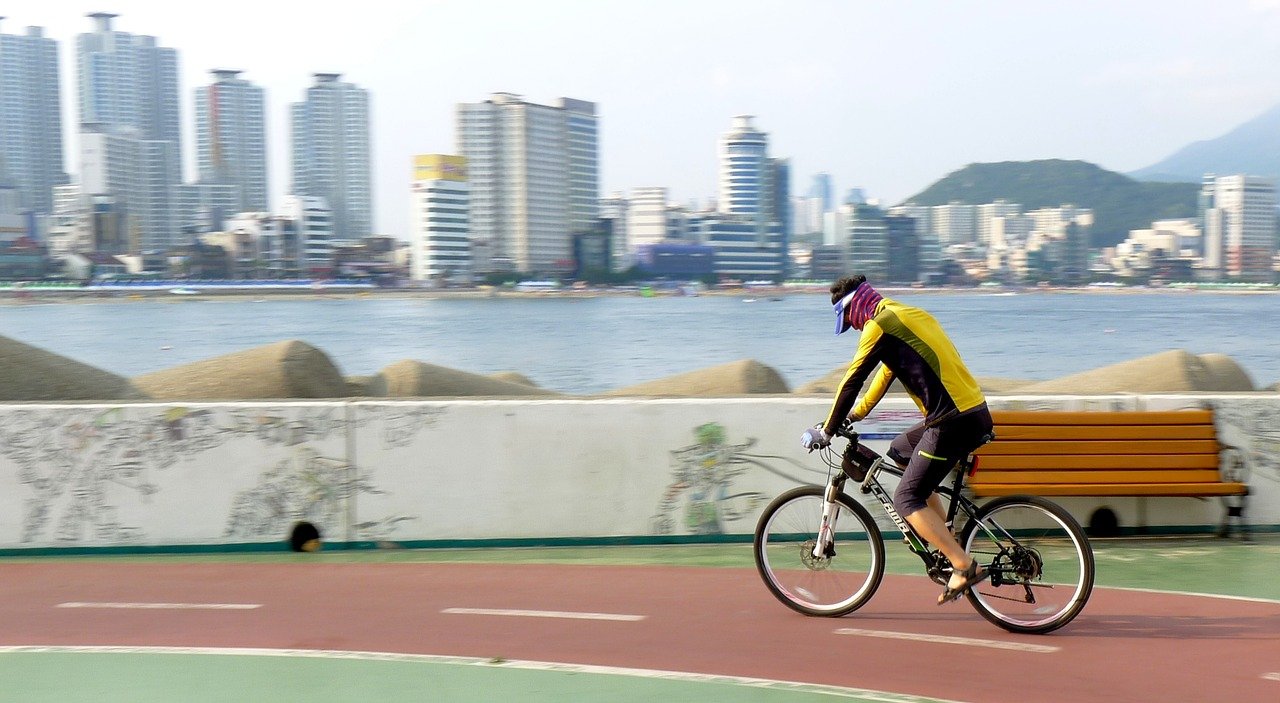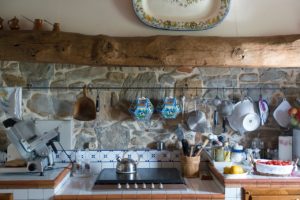Image: ranasinha on Pixabay
In this post we’ll look at lots of action verbs that will come in handy when you’re talking everyday life.
어디 가요? eodi gayo? Where are you going?
Let’s start with a bunch of verbs to talking about coming and going: 가다 gada to go; 출근하다 chulgeunhada to go to work; 걷다 geotda to walk; 오다 oda to come, 떠나다 tteonada to leave; 도착하다 dochakada to arrive; 나가다 nagada to go out; 들어가다 deureogada to enter.
- 자동차로 출근한다. 나는 걸어서 출근한다.
jadongcharo chulgeunhanda. naneun georeoseo chulgeunhanda.
I go to work by car. I go to work on foot. - 일요일마다 공원을 걷는다.
illyoilmada gongwoneul geonneunda.
We walk in the park every Sunday. - 이번 주말 파티에 누가 와요?
ibeon jumal patie nuga wayo?
Who’s coming to the party this weekend?
- 보통 늦게 퇴근해요.
botong neutge toegeunhaeyo.
I usually leave work late. - 기차는 오전 열시에 도착해요.
gichaneun ojeon yeolsie dochakaeyo.
The train arrives at 10am. - 친구들과 함께 나가요.
chingudeulgwa hamkke nagayo.
I go out with my friends. - 밤에 절대 공원에 가지 않아요.
bame jeoldae gongwone gaji anayo.
I never go in the park at night.
몇 시에 일어나요? myeot shi-e ireonayo? What time do you wake up?
Now let’s see some verbs that you can use to talk about your daily routine: 일어나다 ireonada to wake up; 샤워를 하다 syaworeul hada to take a shower; 목욕을 하다 mongnyogeul hada to take a bath; 옷을 입다 oseul ipda to get dressed; 셔츠를 입다 syeocheureul ipda to put on a shirt; 옷을 벗다 oseul beotda to get undressed; 바지를 벗다 bajireul beotda to take off pants; 이를 닦다 ireul dakda to brush your teeth; 손을 닦다 soneul dakda to wash your hands; 아침을/점심을/저녁을 먹다 achimeul/jeomsimeul/jeonyeogeul meokda to have breakfast/lunch/dinner; 잠자러 가다 jamjareo gada to go to bed; 잠을 자다 jameul jada to sleep.
- 주중에는 일찍 일어나고, 주말에는 늦게 일어난다.
jujungeneun iljjik ireonago, jumareneun neutge ireonanda.
I wake up early during the week, and l wake up late on the weekend. - 항상 아침에 샤워를 한다. 절대 목욕은 하지 않는다.
hangsang achime syaworeul handa. jeoldae mongnyogeun haji anneunda.
I always take a shower in the morning. I never take a bath. - 옷을 빨리 입는다.
oseul ppalli imneunda.
I get dressed quickly. - 그녀는 추울 때 스웨터를 입는다.
geunyeoneun chuul ttae seuweteoreul imneunda.
She puts on a sweater when it’s cold. - 잠자기 전에 옷을 벗는다.
jamjagi jeone oseul beonneunda.
I get undressed before bed. - 그는 집에서 신발을 벗는다.
geuneun jibeseo sinbareul beonneunda.
He takes off his shoes in the house. - 먹은 후에 이를 닦는다.
meogeun hue ireul dangneunda.
I brush my teeth after I eat. - 먹기 전에 손을 씻는다.
meokgi jeone soneul ssinneunda.
I wash my hands before I eat. - 보통 몇 시에 자요?
botong myeot sie jayo?
What time do you usually go to bed? - 보통 몇시간 자요?
botong myeotsigan jayo?
How many hours do you usually sleep?
그는 말을 많이 한다. geuneun mareul mani handa. He talks a lot.
Here are several general verbs that you can use in daily life. 말하다 malhada to speak; 이야기하다 (말하다) iyagihada (malhada) to talk; 말하다 malhada to say; 이해하다 ihaehada to understand; 배우다 baeuda to learn; 공부하다 gongbuhada to study; 주다 juda to give; 만들다 mandeulda to make; 가지다 gajida to take; 묻다 mutda to ask; 대답하다 daedapada to answer; 열다 yeolda to open; 닫다 datda to close; 이용하다 iyonghada to use; 집다 jipda to pick up; 놓다 nota to put.
- 몇개 언어를 하세요?
myeotgae eoneoreul haseyo?
How many languages do you speak? - 매일 친구들과 이야기 한다.
maeil chingudeulgwa iyagi handa.
I talk with my friends every day. - 그녀가 뭐라고 말해요? 나는 이해가 안돼요.
geunyeoga mworago malhaeyo? naneun ihaega andwaeyo.
What is she saying? I don’t understand. - 아이들은 학교에서 많은 것을 배운다.
aideureun hakgyoeseo maneun geoseul baeunda.
Children learn a lot in school. - 대학교에서 무엇을 공부해요?
daehakgyoeseo mueoseul gongbuhaeyo?
What do you study at university? - 내 친구의 생일에 선물을 준다.
nae chinguui saengire seonmureul junda.
I give my friend a present on her birthday. - 아이들은 부모님을 위해 선물을 만든다.
aideureun bumonimeul wihae seonmureul mandeunda.
The children make gifts for their parents. - 아침에 기차나 버스를 타요?
achime gichana beoseureul tayo?
Do you take the train or the bus in the morning? - 아이들은 많은 질문을 한다.
aideureun maneun jilmuneul handa.
Children ask a lot of questions. - 선생님은 질문에 답한다.
seonsaengnimeun jilmune dapanda.
The teacher answers questions. - 그녀는 문을 연다.
geunyeoneun muneul yeonda.
She opens the door. - 그는 문을 닫는다.
geuneun muneul danneunda.
He closes the door. - 펜이나 연필을 사용해요?
penina yeonpireul sayonghaeyo?
Do you use a pen or a pencil? - 내 가방을 든다.
nae gabangeul deunda.
I pick up my bags. - 보통 열쇠를 서랍에 놓는다.
botong yeolsoereul seorabe nonneunda.
I usually put my keys in a drawer.
무엇을 (뭐를) 먹어요? mueos-eul (mwo-reul) meogeoyo? What are you eating?
Now let’s look at some verbs that you can use to talk about typical situations at home: 먹다 meokda to eat; 마시다 mashida to drink; 요리하다 yorihada to cook; 청소하다 cheongsohada to clean; 설거지하다 seolgeojihada to do the dishes; 세탁하다 setakhada to do the laundry; 접시를 치우다 jeopshireul chiuda to put away the dishes; 티비를(텔레비전을) 보다 tibireul(tellebijeoneul) boda to watch TV; 음악을 듣다 eumageul deutda to listen to music; 읽다 ilda to read; 휴식을 취하다 hyusigeul chwihada to relax; 눕다 nupda to lie down; 앉다 anda to sit down; 서다 seoda to stand up.
- 밥을 많이 먹는다.
bab-eul mani meokneunda.
I eat a lot of rice. - 아침에 커피나 차를 마셔요?
achim-e keopi-na char-eul masheoyo?
Do you drink tea or coffee in the morning? - 요리를 참 잘해요.
yori-reul cham jalhaeyo.
You cook very well! - 토요일마다 아파트를 청소한다.
toyoilmada apateu-reul cheongsohanda.
I clean my apartment on Saturdays. - 우리는 매일 저녁 설거지를 한다.
uri-neun maeil jeonyeok seolgeoji-reul handa.
We do dishes every evening. - (그는) 일요일마다 빨래를 한다.
(geu-neun) iryoilmada ppallae-reul handa.
He does laundry on Sundays. - 우리는 접시가 깨끗할 때 그것들을 치운다.
uri-neun jeopshiga kkaekkeushal ttae geugeosdeur-eul chiunda.
We put the dishes away when they are clean. - 매일 저녁 텔레비전을 봐요?
maeil jeonyeok tellebijeon-eul bwayo?
Do you watch TV every evening? - 매일 음악을 듣는다.
maeil eumag-eul deutneunda.
I listen to music every day. - 매일 밤 침대에서 책을 읽는다.
maeil bam chimdae-eseo chaeg-eul ilneunda.
I read every night in bed. - 우리는 주말마다 휴식을 취한다.
uri-neun jumalmada hyushigeul chwihanda.
We relax every weekend. - 오후에 눕는다.
ohu-e nupneunda.
I lie down in the afternoon. - 우리는 거실에 앉는다.
uri-neun geoshir-e anneunda.
We sit down in the living room. - (그는) 일어서서 방을 나간다.
(geu-neun) ireoseoseo bang-eul naganda.
He stands up and leaves the room.
나는 음식을 사고있다. na-neun eumshig-eul sagoitda. I’m buying food.
Here are some common verbs related to shopping: 사다 sada to buy; 쇼핑 가다 shoping gada to go shopping; 찾다 chada to look for, to find; 지불하다 jibulhada to pay; (비용이) 들다 (biyongi) deulda to cost; 입어보다 ibeoboda to try on; 돈을 쓰다 do-eul sseudato spend money; ATM (현금자동인출기) 에서 돈을 찾다 ATM (hyeongeumjadonginchulgi)-eseo doneul chajda to withdraw money from an ATM; 돈을 모으다 don-eul moeuda to save money.
- 우리는 슈퍼마켓에서 음식을 산다.
uri-neun syupeomakes-eseo eumshig-eul sanda.
We buy food at the supermarket. - 우리는 주말마다 쇼핑을 간다.
uri-neun jumalmada syoping-eul ganda.
We go shopping every weekend. - 나는 새신발을 찾고 있다.
na-neun saeshinbar-eul chajgo itda.
I’m looking for a new pair of shoes. - 그는 이 가게에서 항상 재미있는 것을 찾는다.
geu-neun i gage-eseo hangsang jaemiitneun geoseul chajneunda.
He always finds something interesting in this store. - 결제는 현금이나 카드로 해요?
gyeolje-neun hyeongeumina kadeuro haeyo?
Do you pay by cash or credit card? - 비용이 얼마입니까?
biyongi eolmaimnikka?
How much does that cost? - 옷을 사기전에 항상 입어본다.
os-eul sagijeone hangsang ibeobonda.
I always try on clothes before I buy them. - 그녀는 책에 많은 돈을 쓴다.
geunyeo-neun chaeg-e manheun doneul sseunda.
She spends a lot of money on books. - 현금자동인출기에서 돈을 뽑는다.
hyeongeumjadonginchulgi-eseo don-eul ppopneunda.
I’m taking money out at the ATM. - 모든 것들이 비싸기 때문에 나는 돈을 모으지 않는다.
modeun geosdeuri bissagi ttaemune na-neun don-eul moeuji anhneunda.
I never save money because everything is so expensive.
어디서 일해요? Where do you work?
Now let’s look at some common verbs you can use at work: 일하다 ilhada to work; 시작하다 shijakhada to start; 끝나다 kkeutnada to end; 쓰다 sseuda to write; 전화를 하다 jeonhwareul hada to call (on phone); 이메일을 보내다 imeir-eul bonaeda to send an email; 이메일을 받다 imeir-eul batda to get an email; 휴식을 취하다 hyushig-eul chwihada to take a break; 회의를 한다 hoeui-reul handa to have a meeting; 논의하다 nonuihada to discuss.
- 나는 월요일, 화요일, 수요일, 목요일, 금요일에 일한다. 나는 토요일, 일요에는 일하지 않는다.
I work on Mondays, Tuesdays, Wednesdays, Thursdays, and Fridays. I don’t work on Saturdays and Sundays. - 회의는 매주 월요일 오전 열시에 시작한다.
The meeting starts every Monday at 10am. - 회의는 몇 시에 끝나요?
What time does the meeting end? - 그는 많은 보고서를 쓴다.
He writes a lot of reports. - 내 고객에게 전화한다.
I call my clients on the phone. - 그녀는 많은 이메일을 보낸다.
She sends a lot of emails. - 그녀는 많은 이메일을 받는다.
She receives a lot of emails. - 나는 오후에 휴식을 취하고 커피를 마신다.
I take a break in the afternoon and drink some coffee. - 우리는 많은 회의를 한다.
We have a lot of meetings. - 그들의 회의에서 무엇을 논의해요?
What do they discuss in the meetings?
우리는 좋은 시간을 보내고 있어요! We’re having a good time!
Now that we’ve gotten work out the way, let’s see some verbs that you can use for your free time: 좋은 시간을 보내다/ 즐기다 to have a good time/to enjoy yourself; 춤추다 to dance; 노래하다 to sing; 웃다 (미소 짓다) to smile; 웃다 to laugh, 운동하다 to work out; 수영하다 to swim; 달리다 to run; (스포츠를)하다 to play (a sport); (악기를) 연주하다 to play (a musical instrument); 뛰다 to jump; 오르다 to climb; 기다 to crawl; (자전거)타다 to bike; 운전하다 to drive; 던지다 to throw; 받다 to catch.
- 나는 친구들과 항상 좋은 시간을 보낸다.
I always have a good time with my friends. - 우리는 주말마다 클럽에 가서 춤을 춘다.
We go to nightclubs and dance every weekend. - 그녀는 정말 노래를 잘한다.
She sings really well! - 그는 항상 웃는다. 그는 슬프지 않다.
He always smiles. He’s never sad. - 그들은 함께 있을 때 웃는다.
They laugh when they’re together. - (나는) 일주일에 4-5일 운동한다.
I work out four or five days a week. - 수영장이나 호수에서 수영해요?
Do you swim in a pool or in a lake? - 아이들은 운동장에서 달린다.
The children run in the playground. - 우리는 야구를/농구를/축구를 한다.
We play baseball/basketball/soccer. - 나는 피아노를/트럼펫을/바이올린을 연주한다.
I play piano/trumpet/violin. - 소년들은 침대에서 뛴다.
The boys jump on the bed. - 소녀들은 나무에 오른다.
The girls climb trees. - 아기가 바닥을 기다.
The baby crawls on the floor. - 우리는 주말마다 공원에서 자전거를 탄다.
We bike every weekend in the park. - 나는 매일 직장까지 운전한다.
I drive to work every day. - 소년은 공을 던진다.
The boy throws the ball. - 소녀는 공을 받는다.
The girl catches the ball.
뭔가 냄새가 난다. I smell something.
Here are a few verbs related to the senses: 냄새 맡다to smell; 듣다/ 들리다to hear; 보다to see; 맛보다to taste; 만지다to touch; 느끼다to feel; ~인 것 같다to seem/appear; 생각하다to think; 믿다to believe; 알다to know; 모르다 to not know; 사람을 알다to know a person.
- 신선한 빵 냄새가 난다.
It smells like fresh bread. - 이 꽃 향기가 정말 좋다!
This flower smells really nice! - 그 아이는 그가 보는 모든 것을 만진다.
The child touches everything he sees. - 새 소리를 들려요?
Do you hear the birds? - 저기 있는 여자를 봐요?
Do you see the woman over there? - 나는 요리할 때 언제나 맛을 본다.
I always taste food while I cook. - 이 수프는 맛이 좋다.
This soup tastes good. - 오늘 기분이 어때요?
How do you feel today? - 그녀는 뭔가 불만인것 같다.
She seems unhappy about something. - 무엇을 생각하고 있어요?
What are you thinking about? - 그의 설명을 믿어요?
Do you believe his explanation? - 그것이 뭐예요? 나는 몰라요.
What is that? I don’t know. - 그의 동생/누나를 안다.
I know his sister.
안 들려요. I can’t hear!
Now let’s look at a few modals and types of verbs that you can combine with other verbs: 할 수 있다 can do; 어떻게 하는지 안다 know how to do; 해야 한다 must do/have to do; 하고싶다 want to do; 해야 한다 need to do; 하기 시작하다 start doing; 하는 것을 멈추다 stop doing; 계속하다 continue/keep doing.
- 텔레비전을 볼 수 있어요?
Can you see the television? - 기타를 어떻게 연주하는지 알아요?
Do you know how to play guitar? - 내일 일 해야 한다.
I have to work tomorrow. - 오늘 밤에 뭐 하고 싶어요?
What do you want to do tonight? - 공부해야 한다. 내일 시험이 있다.
I need to study. I have a test tomorrow. - 아침 일찍 일을 시작한다.
We start working early in the morning. - 한밤중에 읽기를 멈추고 자러 간다.
I stop reading at midnight and go to bed. - 그들은 영화보는 동안 계속 말한다.
They keep talking during the movie.
Learn Korean with the Language Garage
Check out our other posts on Korean language, culture, and more. And if you’re looking for convenient and affordable live Korean lessons with a real teacher, check out The Language Garage. Our lessons are given online in a virtual classroom, so it doesn’t matter where you live or work – we can come to you. And we have flexible options, with a free trial so that you can decide if there’s a fit. Check us out!






